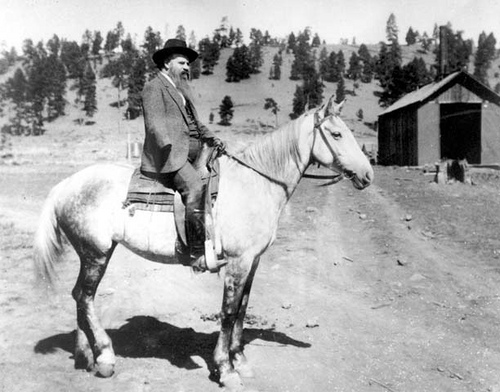Where Are You Now, John Wesley Powell?
categories: Cocktail Hour
Comments Off on Where Are You Now, John Wesley Powell?
 Just posted the below, with a slightly more over-the-top title, at my “Wild Life” blog:
Just posted the below, with a slightly more over-the-top title, at my “Wild Life” blog:
Why We Could Use John Wesley Powell Right Now
Last week a confluence of sorts. I had finally reached the part in the book I’m writing about the American West when I could focus on Major John Wesley Powell. And then, after a couple hours of studying Powell, I went to get my coffee and saw this headline in the New York Times: “Not Even Close: 2012 Was the Hottest Ever in U.S.”
At first glance it might not seem like much of a coincidence. What does the latest overwhelming evidence of climate change have to do with a Civil War veteran most famous for being the first man of European heritage to plunge down the Colorado River?
Well, quite a lot as it turns out. Powell might be best known for running a river in a wooden boat, but it was what he did over the next 20 years that place him right at the top of the pantheon of Western environmental thinkers. What he did was wade into the halls of Congress, in his role as the head of the Geological Survey of the Rocky Mountain Region from 1870 to 1894, and consistently, unflappably, stubbornly, but reasonably, place scientific fact before a body of politicians who practically wallowed in irrationality, self-interest, and superstition. What he did was continue to fly the flag of reason and fact, consistently putting the public good over private interest, despite those who tried to tear him down. And what he did, most of all, was form an over-arching vision of the American West as an arid to semi-arid land where humans, if they were to inhabit it at all, would need to understand certain facts, facts specific to that particular place.
Oh, and did I mention he had one arm? Well, he did, which makes it even more impressive that he led nine men down the Green River and then the Colorado into the Grand Canyon. It was terra incognita and he had heard rumors that they would encounter falls the size of Niagara, meaning that every time he heard a rumble around the corner he knew it might be sounding his crew’s doom. The physical courage that held him in good stead in the canyon translated into intellectual and political courage when he emerged.
Read the rest here:

